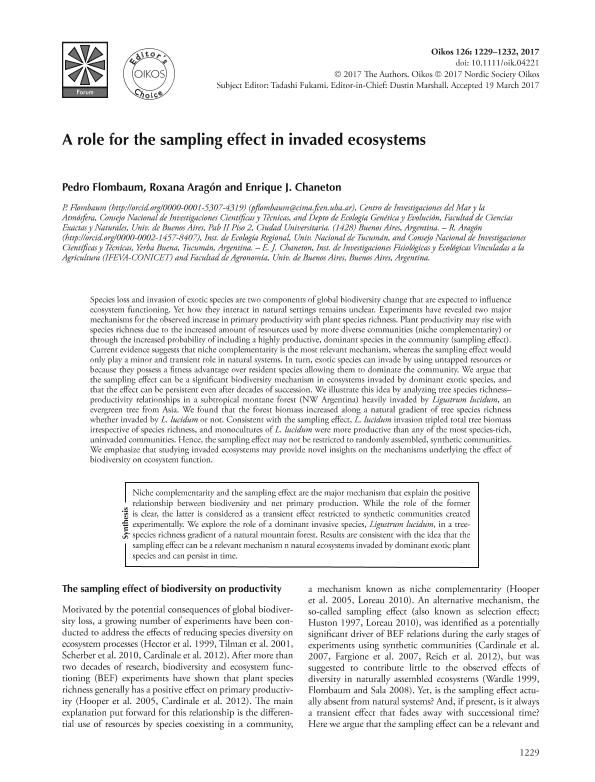Mostrar el registro sencillo del ítem
dc.contributor.author
Flombaum, Pedro

dc.contributor.author
Aragón, Myriam Roxana

dc.contributor.author
Chaneton, Enrique Jose

dc.date.available
2018-08-21T15:50:23Z
dc.date.issued
2017-09
dc.identifier.citation
Flombaum, Pedro; Aragón, Myriam Roxana; Chaneton, Enrique Jose; A role for the sampling effect in invaded ecosystems; Wiley Blackwell Publishing, Inc; Oikos; 126; 9; 9-2017; 1229-1232
dc.identifier.issn
0030-1299
dc.identifier.uri
http://hdl.handle.net/11336/56335
dc.description.abstract
Species loss and invasion of exotic species are two components of global biodiversity change that are expected to influence ecosystem functioning. Yet how they interact in natural settings remains unclear. Experiments have revealed two major mechanisms for the observed increase in primary productivity with plant species richness. Plant productivity may rise with species richness due to the increased amount of resources used by more diverse communities (niche complementarity) or through the increased probability of including a highly productive, dominant species in the community (sampling effect). Current evidence suggests that niche complementarity is the most relevant mechanism, whereas the sampling effect would only play a minor and transient role in natural systems. In turn, exotic species can invade by using untapped resources or because they possess a fitness advantage over resident species allowing them to dominate the community. We argue that the sampling effect can be a significant biodiversity mechanism in ecosystems invaded by dominant exotic species, and that the effect can be persistent even after decades of succession. We illustrate this idea by analyzing tree species richness–productivity relationships in a subtropical montane forest (NW Argentina) heavily invaded by Ligustrum lucidum, an evergreen tree from Asia. We found that the forest biomass increased along a natural gradient of tree species richness whether invaded by L. lucidum or not. Consistent with the sampling effect, L. lucidum invasion tripled total tree biomass irrespective of species richness, and monocultures of L. lucidum were more productive than any of the most species-rich, uninvaded communities. Hence, the sampling effect may not be restricted to randomly assembled, synthetic communities. We emphasize that studying invaded ecosystems may provide novel insights on the mechanisms underlying the effect of biodiversity on ecosystem function.
dc.format
application/pdf
dc.language.iso
eng
dc.publisher
Wiley Blackwell Publishing, Inc

dc.rights
info:eu-repo/semantics/openAccess
dc.rights.uri
https://creativecommons.org/licenses/by-nc-sa/2.5/ar/
dc.subject
Diversity
dc.subject
Productivity
dc.subject
Invasion
dc.subject
Tropical Forests
dc.subject.classification
Otras Ciencias Biológicas

dc.subject.classification
Ciencias Biológicas

dc.subject.classification
CIENCIAS NATURALES Y EXACTAS

dc.title
A role for the sampling effect in invaded ecosystems
dc.type
info:eu-repo/semantics/article
dc.type
info:ar-repo/semantics/artículo
dc.type
info:eu-repo/semantics/publishedVersion
dc.date.updated
2018-08-16T15:12:59Z
dc.journal.volume
126
dc.journal.number
9
dc.journal.pagination
1229-1232
dc.journal.pais
Reino Unido

dc.journal.ciudad
Londres
dc.description.fil
Fil: Flombaum, Pedro. Consejo Nacional de Investigaciones Científicas y Técnicas. Oficina de Coordinación Administrativa Ciudad Universitaria. Centro de Investigaciones del Mar y la Atmósfera. Universidad de Buenos Aires. Facultad de Ciencias Exactas y Naturales. Centro de Investigaciones del Mar y la Atmósfera; Argentina. Universidad de Buenos Aires. Facultad de Ciencias Exactas y Naturales. Departamento de Ecología, Genética y Evolución; Argentina
dc.description.fil
Fil: Aragón, Myriam Roxana. Universidad Nacional de Tucumán. Instituto de Ecología Regional. Consejo Nacional de Investigaciones Científicas y Técnicas. Centro Científico Tecnológico Conicet - Tucumán. Instituto de Ecología Regional; Argentina
dc.description.fil
Fil: Chaneton, Enrique Jose. Consejo Nacional de Investigaciones Científicas y Técnicas. Oficina de Coordinación Administrativa Parque Centenario. Instituto de Investigaciones Fisiológicas y Ecológicas Vinculadas a la Agricultura. Universidad de Buenos Aires. Facultad de Agronomía; Argentina
dc.journal.title
Oikos

dc.relation.alternativeid
info:eu-repo/semantics/altIdentifier/doi/https://dx.doi.org/10.1111/oik.04221
dc.relation.alternativeid
info:eu-repo/semantics/altIdentifier/url/https://onlinelibrary.wiley.com/doi/abs/10.1111/oik.04221
Archivos asociados
